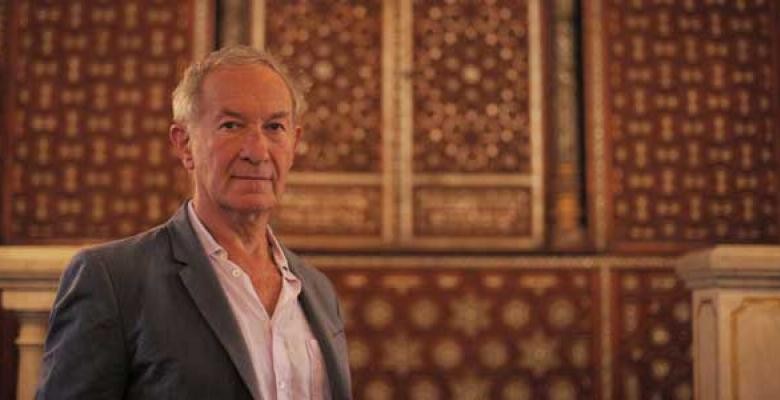Simon Schama Documents 3,000 Years of Jewish History in New PBS Series

After a distinguished career that has spawned numerous books and television series on everything from the French Revolution to the slave trade, Columbia Professor of Art History and History Simon Schama is now unveiling his most personal project yet: "The Story of the Jews," a multimedia account of 3,000 years of Jewish history.
Much like the early Jews he chronicles, who produced both a written and an oral Torah, Schama has produced a five-part PBS documentary series and a two-volume book. The PBS series premieres with its first two episodes on March 25 and concludes a week later on April 1 with the final three installments. The first volume of the book, subtitled "Finding the Right Words 1,000 B.C. – 1492 A.D.," was published March 18; the second volume, bearing the subtitle "When Words Fail," brings readers to the present day. It arrives in the fall.
The narrative of the Jews has, of course, been told countless times. As Schama observes, “Anyone venturing into Jewish history has to be dauntingly aware of the immense mountain ranges of multivolume scholarship towering behind him.” But Schama, a British-born Jew who has won many literary and academic awards and is a University Professor—Columbia’s highest academic rank—is up to the challenge. At the beginning of the first episode he says, “What ties us together is a story kept in our heads and hearts, a story of suffering and resilience and endurance and creativity that made me want to become a historian in the first place.”
Schama’s version of Jewish history begins in 10th-century B.C., in Persian-ruled Egypt on the Nile island of Elephantine. Thanks to the 20th-century discovery of a cache of ancient manuscripts known as the Elephantine papyri, a remarkable amount is known about this garrison town of Jewish soldiers and their families.
From there, the series follows Schama as he travels from Russia and the Ukraine to Israel and Spain, exploring the imprint that Jewish civilization has made on the world. He manages to be both erudite and entertaining as he makes this journey, weaving together many strands, including art history and history—the two scholarly disciplines he has taught at Cambridge, Oxford, Harvard and now Columbia.
Schama wanted "The Story of the Jews" to give a sense of what binds Jews together as a people beyond religious observance. He also wanted to give non-Jews an entry point into Jewish history that starts centuries before the Holocaust and Israel.
To accomplish this, he humanizes the story by talking about its dramatic turning points with living witnesses like Aviva Rahamim, who, as a 14-year-old, walked across the Sudanese desert to try and reach Israel; Yakub Odeh, a Palestinian whose village was destroyed in the 1948 war; and Levana Shamir, whose family members were imprisoned in Egypt at the same time. He debates the meaning of new archaeological discoveries of the Biblical period with Yosef Garfinkel of Hebrew University; the Dead Sea Scrolls with their chief curator Pnina Shor; and the character of the Talmud with Leon Wieseltier, literary editor of "The New Republic." Schama also highlights the Jewish contributions to the arts—mosaics and other brilliantly colorful synagogue decorations, spectacularly illustrated Bibles and the music that carried Jewish tradition through the centuries.
“If you were to remove from our collective history the contribution Jews have made to human culture, our world would be almost unrecognizable,” he said. “There would be no monotheism, no written Bible, and our sense of modernity would be completely different. The history of the Jews is everyone’s history, too, and what I hope people will take away from the series is that sense of connection.”